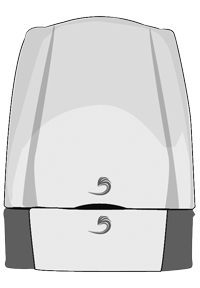Ultibro® Breezhaler®
This product is manufactured by Novartis and is a combination of two ingredients, indacaterol maleate and glycopyrronium bromide.
This product is inhaled into the lungs using the Breezhaler®.

play
Breezhaler®
Why is it prescribed?
This medication is used for the maintenance treatment of chronic obstructive pulmonary disease (COPD), including emphysema and chronic bronchitis. Regular daily use is important for this medication to be effective. It will not relieve an episode of increased difficulty breathing.
- Do not swallow ULTIBRO® BREEZHALER® capsules.
- Only use the inhaler contained in this pack.
- ULTIBRO® BREEZHALER® capsules must always be stored in the blister, and only removed immediately before use.
- Never place a capsule directly into the mouthpiece of the inhaler.
- Do not press the piercing buttons more than once.
- Never blow into the mouthpiece of the inhaler.
- Always release the push buttons before inhalation.
- Never wash the inhaler with water. Keep it dry.
- Never use more frequently than once daily
- Avoid getting the powder into your eyes
- You can use this medication before or after food or drink
- Store at room temperature away from heat and moisture.
Alternatives
Other products that have the same ingredients as Ultibro® Breezhaler® are •Enerzair® Breezhaler® ••Enerzair® Breezhaler® •
See other products used in the treatment of •COPD •asthma •chronic bronchitis (COPD) •emphysema (COPD) •
The recommended dosage is: Oral inhalation of one capsule once daily. Not for use if under 18 years of age.
This combination product contains two medications glycopyrronium and indacaterol. Glycopyrronium belongs to the group of medications known as anticholinergics. Indacaterol belongs to the group of medications known as long-acting bronchodilators. These medications work in different ways to relax the muscles in the walls of the small air passages in the lung, keeping the air passages open and making it easier to breathe.
Contact your doctor if you experience these side effects and they are severe or bothersome:
- cough
- diarrhea
- difficulty falling asleep
- dizziness
- dry mouth
- headache
- heartburn
- nausea
- shakiness
- skin rash, itchiness
- sore mouth
- sore throat
- upset stomach
- vomiting
Although most of the side effects listed below don't happen very often, they could lead to serious problems if you do not check with your doctor or seek medical attention.
Check with your doctor as soon as possible if any of the following side effects occur:
- feeling of pressure or pain in cheeks or forehead
- fever
- high blood pressure
- irregular heartbeat
- leg or arm pain
- nervousness
- pain in muscles, joints or bones
- symptoms of decreased amount of potassium in the blood (e.g., irregular heartbeat, muscle weakness and spasms, general feeling of being unwell)
- symptoms of glaucoma (e.g., blurred vision, seeing halos of bright colours around lights, red eyes, increased pressure in your eyes, eye pain or discomfort)
- symptoms of high blood sugar (e.g., frequent urination, increased thirst, excessive eating, unexplained weight loss, poor wound healing, infections, fruity breath odour)
- symptoms of a urinary tract infection (e.g., pain when urinating, urinating more often than usual, low back or flank pain)
- tingling or numbness
Stop taking the medication and seek immediate medical attention if any of the following occur:
- crushing chest pain (signs of not enough blood and oxygen getting to the heart)
- signs of a serious allergic reaction (e.g., abdominal cramps, difficulty breathing, nausea and vomiting, or swelling of the face and throat)
- sudden worsening of shortness and breath after using inhaler
I
Use with caution if you:
- Are an asthmatic
- Have heart problems, such as rapid or irregular heart beat or abnormal electrical signal called “prolongation of the QT interval”;
- Have high blood pressure;
- Have seizures;
- Have thyroid gland problems or disease;
- Have diabetes
- Have problems with your kidneys;
- Have severe liver problems;
- Have eye problems, such as glaucoma or eye pain, blurred vision, see halos around lights or coloured images;
- Have an enlarged prostate, problems passing urine, or painful urination;
The following may interact with Ultibro® Breezhaler®:
- Medicines used in the treatment of depression or sad mood (e.g. tricyclic antidepressants, monoamine oxidase inhibitors)
- Medicines for your lung disease which contain active substances similar (same class) to those in this preparation (use of these may increase the risk of experiencing possible side effects)
- Medicines that decrease the level of potassium in your blood. These include diuretics (also known as “water tablets” and used to treat high blood pressure, e.g. hydrochlorothiazide), other bronchodilators such as methylxanthines used for breathing problems (e.g. theophylline) or steroids (e.g. prednisolone)
- Beta-blockers used in the treatment of high blood pressure or other heart problems (e.g. propranolol) or in the treatment of glaucoma (e.g. timolol)
- Ketoconazole
- Ritonavir
- Erythromycin
- Verapamil
Use in pregnancy and breastfeeding: Human data is lacking at this time. Consult with your doctor or pharmacist before using.
